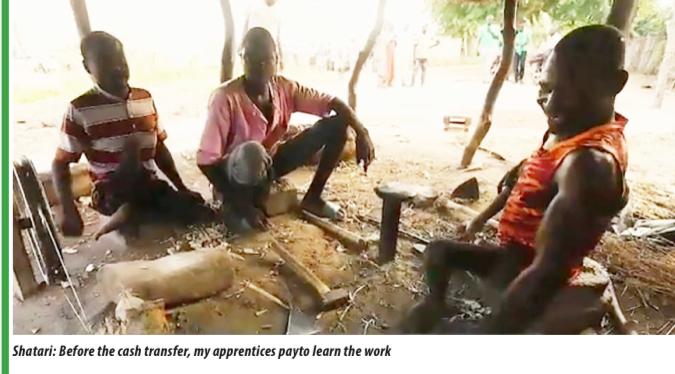In 2022, the National Bureau of Statistics (NBS) “National Multidimensional Poverty Index” released a report, which said six out of ten persons are multidimensionally poor and Nigeria’s 133 million people living in Multidimensional Poverty.
Recall that In 2016, the former President Muhammadu Buhari-led administration established the National Social Investment Program (NSIP) to address socio-economic imbalances, alleviate poverty, and stimulate economic growth.
Among the various empowerment programs under NSIP, the Conditional Cash Transfer (CCT) has played a significant role in transforming the lives of beneficiaries. One such beneficiary is Malama Kyauta Uba Dangauro, who shares her inspiring story of how the CCT program rekindled hope and helped her sustain her seven orphaned grandchildren through petty trading.
Kyauta Uba Dangauro, a resident on the outskirts of Kano metropolis, narrates her experience of receiving the CCT empowerment program. With a cheerful mood, she explains how the first installment of N20,000 changed her life from misery to prosperity. Kyauta engaged in frying coconuts and tiger nuts, which she supplied to petty traders. To her surprise, the money kept multiplying, and she continued her business. She expresses her gratitude to Allah for the intervention and hopes for more blessings.
Kyauta’s story takes a tragic turn with the loss of her son, who left behind seven children. Following his death, her young daughter-in-law was taken away by her parents and married off to another man. This forced Kyauta to take care of her seven orphaned grandchildren, while also relying on the financial support of their uncle, whose resources were limited. Despite the challenges, Kyauta has been providing for the children with the help of the CCT intervention.
Kyauta’s renewed hope and vision are evident as she talks about how the CCT intervention rekindled her hope and wiped away her tears. With the support of the CCT program, she was able to secure her own house and move away from a rented apartment. The eldest grandchild, a girl, is about to finish her secondary school, and the younger ones are following in her footsteps. Kyauta is grateful to former President Muhammadu Buhari and the leadership of the NSIP for the life-changing intervention they provided.
Expressing her appreciation, Kyauta highlights the positive impact of the CCT intervention on her life and the lives of her grandchildren. She mentions that she no longer struggles to provide shelter and food for her family. The CCT empowered her to become self-reliant, ensuring her grandchildren’s education and overall well-being.

The program also gave her eldest granddaughter an opportunity to contribute to the family income through the coconut and tiger nut business. Kyauta recognizes the CCT intervention as a turning point that liberated her family from poverty.
From Kyauta’s testimony, it becomes evident that the NSIP and its CCT intervention have been instrumental in lifting millions of Nigerians out of poverty and despair. The impact of the NSIP on the lives and livelihoods of countless individuals cannot be quantified. Kyauta’s story is a reflection of many other families that desperately need assistance and have found hope through the NSIP programs.

The Conditional Cash Transfer (CCT) empowerment program under the National Social Investment Program (NSIP) has transformed the life of Kyauta Uba Dangauro and her seven orphaned grandchildren. Through the CCT intervention, Kyauta found renewed hope, economic stability, and the means to sustain her family. The program empowered her to become self-reliant, provided her with a house, and enabled her eldest granddaughter to contribute to the family income.
Beyond Kyauta’s individual story, the impact of the NSIP and its CCT intervention extends to countless families across Nigeria. The program has been a pillar of support, lifting people out of poverty and providing them with the means to improve their lives.
One inspiring success story is that of Ezekiel Shatari, a cripple residing in Taraba State. Prior to his involvement with NSIP, Shatari relied on begging to support his family. However, through NSIP’s intervention, he not only abandoned this degrading practice but also established his own blacksmith workshop.
Shatari recounts his past struggles, where he had no choice but to beg for his family’s survival. However, the tide turned when NSIP’s Conditional Cash Transfer (CCT) initiative reached him.
The intervention provided Shatari with the capital he needed to purchase working tools and charcoal for his blacksmith workshop. As a result, he no longer depended on begging and could provide for his family’s needs, including school fees for his children.
The transformation was remarkable, as Shatari’s disability was turned into a newfound ability to earn a sustainable livelihood.
NSIP’s impact extended beyond Shatari himself, reaching his wife and other apprentices. Previously unemployed, Shatari’s wife now engages in petty trading, thanks to the CCT intervention. By sharing the stipend he received, Shatari enabled his wife to establish her own income-generating activity. This comprehensive approach to empowerment highlights NSIP’s commitment to uplifting entire households, thereby breaking the cycle of poverty.
The NSIP has implemented various programs aimed at empowering individuals and communities. Alongside the CCT program, initiatives such as N-Power, the Government Enterprise and Empowerment Program (GEEP), and the National Home Grown School Feeding Program (NHGSFP) have played vital roles in transforming lives and improving livelihoods.
The N-Power program, for instance, has created employment opportunities for thousands of Nigerian youths, enabling them to gain skills, knowledge, and experience in various sectors. It has helped to bridge the unemployment gap and empower young individuals to contribute to the nation’s economic growth.
GEEP, on the other hand, focuses on providing financial support to small-scale businesses and entrepreneurs. By granting loans and access to capital, the program stimulates economic activity, encourages entrepreneurship, and promotes self-reliance. Many beneficiaries have been able to expand their businesses, create employment opportunities, and contribute to their communities’ development.
The NHGSFP ensures that school children receive nutritious meals, which not only improves their health and well-being but also encourages school attendance and boosts academic performance. The program also supports local farmers by sourcing food materials from them, thereby stimulating agricultural growth and rural development.
The comprehensive approach of the NSIP, with its various programs targeting different areas of need, has yielded significant positive outcomes. The stories of beneficiaries like Kyauta showcase the transformative power of these interventions. Families once trapped in cycles of poverty and despair now have hope, stability, and the means to build a better future.
It is important to acknowledge the commitment and dedication of the government in implementing the NSIP. The former President Muhammadu Buhari’s administration has shown its commitment to addressing socio-economic imbalances, alleviating poverty, and promoting inclusive growth. The impact of the NSIP and its programs is a testament to the government’s vision and efforts to uplift the lives of Nigerians.
However, while celebrating the successes of the NSIP, it is crucial to recognize that there is still work to be done. Poverty and inequality remain significant challenges in Nigeria, and sustained efforts are required to ensure that the benefits of the NSIP reach even more individuals and communities. Continued investment, monitoring, and evaluation of the programs will help identify areas for improvement and ensure that the NSIP remains effective and impactful.
In conclusion, the story of Kyauta Uba Dangauro and her seven orphaned grandchildren is a testament to the transformative power of the Conditional Cash Transfer (CCT) empowerment program under the National Social Investment Program (NSIP). Through the program, Kyauta found hope, stability, and the means to provide for her family. Her story reflects the experiences of many other beneficiaries whose lives have been positively impacted by the NSIP’s various interventions.
We’ve got the edge. Get real-time reports, breaking scoops, and exclusive angles delivered straight to your phone. Don’t settle for stale news. Join LEADERSHIP NEWS on WhatsApp for 24/7 updates →
Join Our WhatsApp Channel










